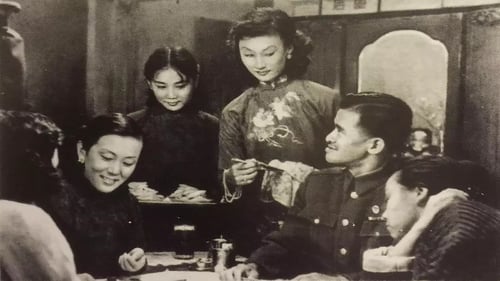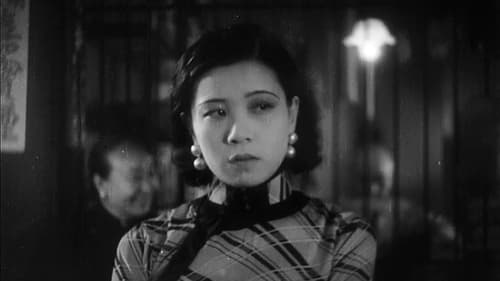Zhang Zhizhi
출생 : 1901-01-01, Changzhou, Jiangsu, China
사망 : 1970-10-29

Ruffian
At a Shanghai apartment, Mr Hou, a Nationalist official, gets ready to move to Taiwan upon the imminent defeat of the KMT during the Civil War. Mrs Hou gives an ultimatum to the rest of the tenants to move out on behalf of her husband, who is the "owner" of the flat and who is now planning to sell it. From the conversations with the rest, we find out that Hou has been a Hanjian during the Sino-Japanese War and that he has since taken over the apartment by force from the old landlord, Mr Kong. The tenants, including Mr Kong, Mrs Xiao, Little Broadcast (alias Mr Xiao, played by Zhao Dan) and a schoolteacher, Mr Hua, and his wife, initially plan to band together, but circumstances force them to find other ways out. Mr Hua tries to find a place to stay at the KMT-sponsored school he is teaching in. Little Broadcast and Mrs Xiao invest in black market gold. As the situation escalates, Mr Hua gets arrested by KMT agents and his young daughter falls desperately ill.

隋炀帝

Smoothie
This movie is based on the famous Chinese folklore that is more than one and a half millennium old. The same folklore was what the Disney animation Mulan is based on, and similarly, it was what many Chinese movies/operas/plays based on.

高衙内

Diaochan (aka Diau Charn and Sable Cicada), one of the Four Beauties of China, is supposed to be so stunningly lovely that the moon was shamed to hide behind clouds. Despite being the only Beauty among the four who is not a real historical figure but one conjured by storytelling imagination and embellished by public fascination, her story was nonetheless incorporated by author Luo Guangzhong into his popular and influential novel Romance of the Three Kingdoms. Her tale is one of Machiavellian intrigue, in which she schemes with her godfather Wang Yun to restore moral order to the land, sowing discord between the corrupt Minister Dong Zhuo and his adopted son Lu Bu, a man of martial and military prowess.

This sound film remake of The Goddess (1934) was headlined by Hu Die, who found stardom at the same time as Ruan Lingyu. Henry Lai Hang and Zhang Zhizhi reprised their roles from the earlier film. The first half of the story follows The Goddness but the second half references Bu Wanchang’s Love and Duty (1931) and King Vidor’s American film Stella Dallas (1937) with additional plots of the heroine’s post-prison story. After years of separation, she hesitates whether to reunite with her son. This new version poses a bigger challenge to a mother’s love and pushes towards the completion of her fate. The characters use dialogue to express their pain and connection, which strengthens the dramatic dilemma and makes the film more straightforward than its predecessor. Hu Die possesses a sort of allure that shows the sadness, shame, and will of a common woman from middle age to old age.

Returning home from a long voyage overseas, a man finds his wife and child living with another man. Fuelled by anger, he murders the other man and is forced to flee justice, until he faces death on a deserted island.


Zhang Da
중국의 제 2세대 감독 손유의 34년도 작품. [대로]는 도로 건설 현장에서 막일을 하는 노동자 진거와 그 친구들의 이야기를 담고 있다. 그들은 바위를 깨고 산을 뚫어 길을 닦는 혹독한 노동 현실에 놓여 있지만, 고통스러워하기 보다는 그것을 소명으로 여기고 즐겁게 받아들이는 청년들이다. 정의롭고 근면 성실한 ‘프론티어’ 정신으로 무장한 그들은 실직을 밥 먹듯 하지만 함께 있어 노래하며 일할 수 있는 건전한 정신과 육체적 활력을 가지고 있다. 이들을 주플롯으로 삼은 덕택에 계몽 영화적 성격이 지배적이지만 거기에는 청년 노동자들과 처녀들의 우정과 사랑, 연대를 강조하는 청춘 영화의 기운도 실려 있다. 그리고 후반부, 민족반역자가 내미는 돈의 유혹을 뿌리치고 기꺼이 고문을 선택하는 장면에서 민족적 항일 영화의 색채도 발견할 수 있을 것이다. 이는 윤리적, 교육적 가치전달을 우선시하는 당대 중국영화 주제 의식에 민족적, 이데올로기적 특성이 부가된 결과다. 일본의 공습으로 몰살당하는 결말도 비관적이지만은 않다. 곧바로 이어지는 진짜 결말은 ‘그들은 여전히 살아있다’는 생존자의 믿음에 따라 혼령들이 하나 둘씩 일어나 ‘투쟁하자, 건설하자’며 노래 부르며 일하는 모습이기 때문이다. 죽음조차 넘어선 그들의 소명 의식에서 당대 중국 영화의 교조적 강박과 중국 사회의 미래와 희망을 엿볼 수 있을 것이다. 시종일관 즐겁고 유머러스한 활기를 띠는 이 영화는 당대 중국이 처한 어두운 현실조차도 즐겁게 노래할 수 있는 능력을 보여준다. 그것은 무성영화의 청각적 단조로움을 몇 개의 뮤지컬 코드와 코믹한 효과음으로 대체하는 것으로 가능했다. 무엇보다 이 영화의 가장 큰 즐거움은 1930년대 상하이 영화계를 주름잡은 조선인 ‘영화황제’ 김염의 모습을 보는 일일 것이다. 내내 달콤한 미소를 짓고 있는 그의 부드러운 카리스마가 어떻게 중국 대륙을 사로잡았는지 짐작하고도 남는다. 강소원(영화평론가)

"Boss" Zhang
A young prostitute, who is trying to give her infant son a good start in life, must contend with a coercive pimp and the prejudices of others.

отец Сяо Фэн
A wild country girl moves to Shanghai with her painter boyfriend and experiences exploitation and poverty.

牛大哥

章阿戆

警备队长

龙王

Bao Jinrong
A silent film based on the legend of Hua Mulan, released by Tianyi Film Company and directed by Li Pingqian. This silent film holds the distinction of being the first ever full-length feature film about Hua Mulan. Mulan is betrothed to a young man when war arrives and their wedding ceremony has to be put on hold. As her fiancé enlists in the army, so too does the filial Mulan, disguised as a man in place of her ailing father. These new plot twists lead to comedic moments when Mulan encounters her fiancé during training and he does not recognize her.








